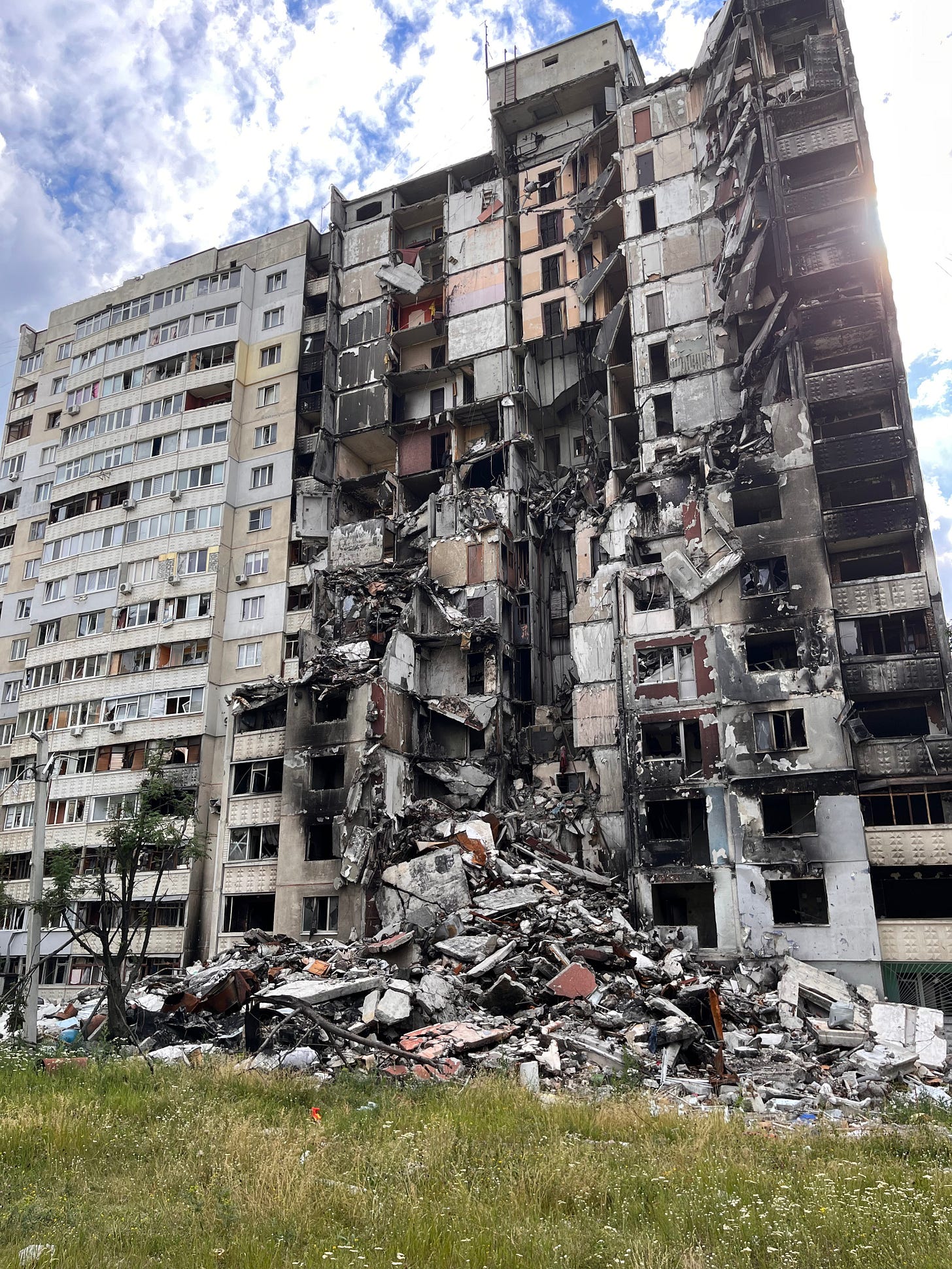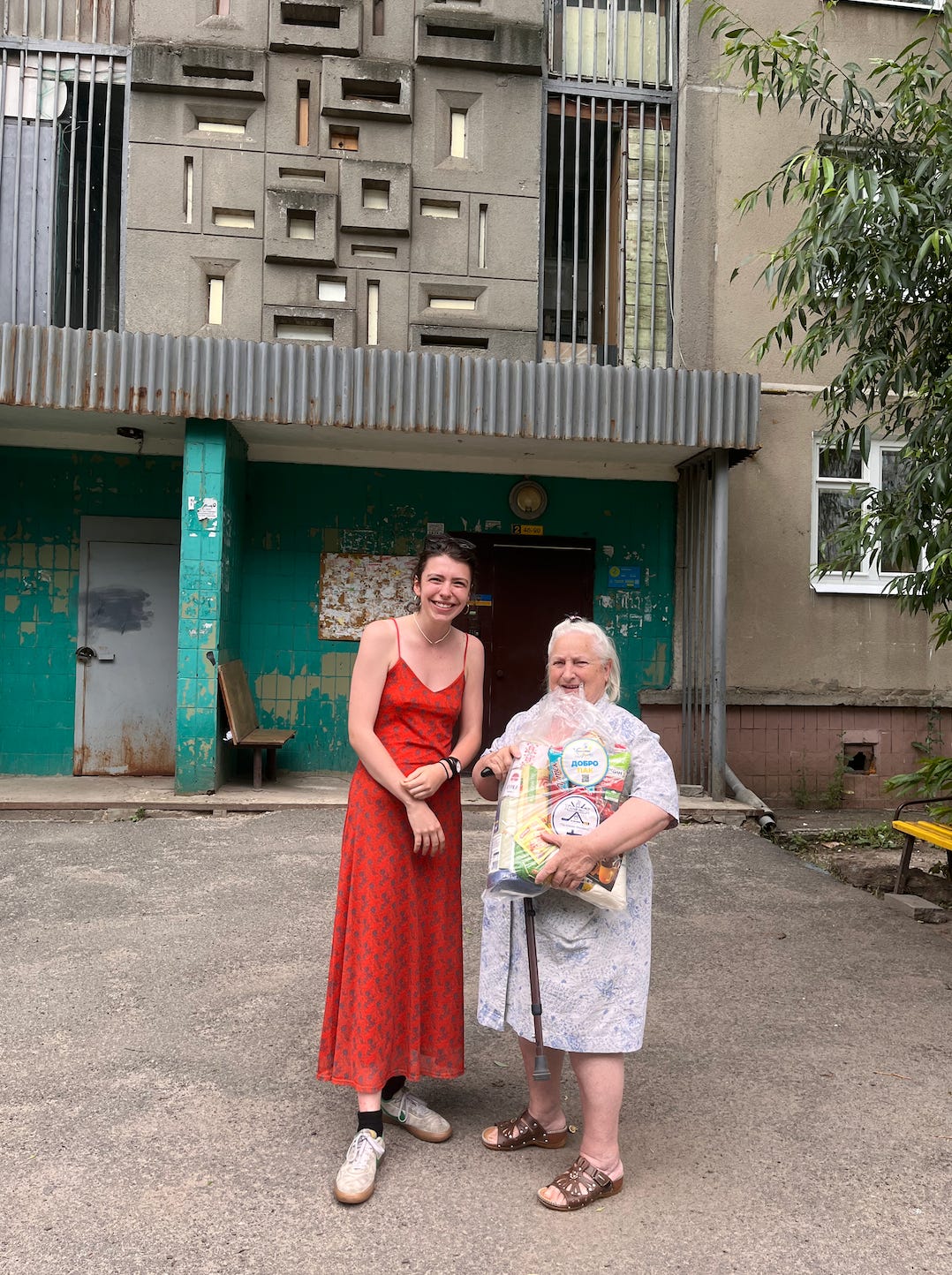On Kharkiv
A few days ago we arrived back in Lviv after spending a week in Kharkiv, where we drove an old Welsh police van filled with non-perishable food packets. I’m sure everyone reading this newsletter is aware of Kharkiv’s significance in the war, and the extent to which the city has been bombarded since 24th February. The majority of the city’s residents have fled, either to the relative safety of western Ukraine, or to the EU. We have spent the past four months listening to the stories of some of those people as they crossed through Przemyśl. Needless to say, the horrors on the ground are far beyond those that people describe. Those who have remained have gotten used to living with a constant soundtrack of artillery in the background. To say that the bombing has been indiscriminate is perhaps too kind. Russia seems to have clearly targeted civilian areas – houses, schools, universities, and medical centres.
The work we do in Kharkiv is predominantly based around supporting our partner organisation, Kharkiv Aid Office. On our trip, we saw first-hand how they operate – spending hours per day delivering food packages, hot meals, and medicines, across the city, both to individuals who reach out to them with their specific needs, and to a selection of apartment blocks, who they provide warm meals to every day. We also saw how the on-the-ground networks which exist are able to work together. Food that we at KHARPP pay for is then delivered by Kharkiv Aid Office to World Central Kitchen, who cook it in their large kitchen space, and give it back to be delivered around the city. In this case, the food packets we drove in were provided by Volunteer100, a Lviv-based organisation. The solidarity and teamwork between the different groups is amazing, but we continue to be shocked by the lack of major NGO presence, with the exception of WCK.
On one delivery run, a man came up me as I stood outside the van, clearly drunk. He asked if he could ask me a question. ‘Why are they doing this?’, he said, close to tears. For several minutes, he just continued to ask – ‘we didn’t do anything to them. We just wanted to be part of Europe. Nothing else. Why are they doing this? Maybe you understand?’. This scene took place in the shadow of his block of flats, with no electricity or running water and half the windows broken from shock waves. I couldn’t respond, and eventually one of his neighbours led him away.
On our way back to Lviv, we passed through Irpin and Bucha, small suburban towns outside Kyiv now infamous for the massacres which happened there early in the war. It was pointed out to us that the populations of the towns had expanded significantly after 2014, as internally displaced people from the Donbas region had fled there from Russian proxies – an important reminder that whilst we generally think of this war as having begun on 24th February, it has actually been going on for eight years. In Irpin, Ukrainian railways has created temporary accommodation for some of those whose homes were shelled in sleeper wagons. The road out of Bucha is lined with mass graves, from which they are continuing to exhume bodies months after liberation.
Over the past few days, we have had two more ambulances arrive from the UK, filled with water purification tablets and high-quality medical supplies. Another will come over the coming days, bringing our total to nine. We want to especially thank the Angela Scott and Fieldrose Charitable Trust, Nicola Shulman and Mulgrave Properties, and Peter Morris and Howard Tenens Logistics Ltd, for their generous donations which enabled us to purchase this fleet, as well as Tro Da Medical Consultancy, for assisting with the cargo. We are so lucky to have the support we do, and I implore you all to continue to be generous in your donations. I have written before about the fears surrounding autumn and winter, and our time in Kharkiv has made clear quite how real those fears are. People will freeze and starve in their homes, and thousands more will inevitably leave the country. We need to be prepared, both in terms of our work in Przemyśl supporting those who leave, and our work in Kharkiv, helping to look after those who stay. As always, you can donate via our PayPal, for the quickest way to get money directly to those who need it, or via our JustGiving if you are able to claim GiftAid.
Scenes of destruction in Kharkiv.
Food and medicine deliveries in Kharkiv.
Receiving certificates in Irpin as a thanks for the ambulance we provided them with a couple of months ago.









